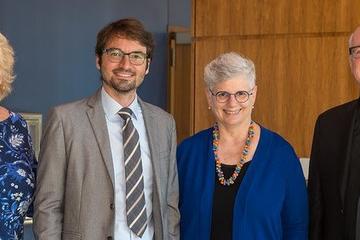
By Donna Orsuto
ADVENT is upon us once again. A great opportunity to “begin again,” to launch into a new liturgical year with joy. The first Advent candle, flickering in the darkness, invites us to embrace the light that is Christ.
Advent is a time of preparing—preparing surely to celebrate the Birth of Christ with our family and friends, but also preparing a space for Christ to enter into our hearts in the here and now, as well as for that day when we will meet Him face to face.
One poem that captures the paradox of the Advent season is Mary Oliver’s poem, “Making the House Ready for the Lord”:
MAKING THE HOUSE READY FOR THE LORD
By Mary Oliver
Dear Lord, I have swept and I have washed but
still nothing is as shining as it should be
for you. Under the sink, for example, is an
uproar of mice –it is the season of their
many children. What shall I do? And under the eaves
and through the walls the squirrels
have gnawed their ragged entrances –but it is the season
when they need shelter, so what shall I do? And
the raccoon limps into the kitchen and opens the cupboard
while the dog snores, the cat hugs the pillow;
what shall I do? Beautiful is the new snow falling
in the yard and the fox who is staring boldly
up the path, to the door. And I still believe you will
come, Lord: you will, when I speak to the fox,
the sparrow, the lost dog, the shivering sea-goose, know
that really I am speaking to you whenever I say,
as I do all morning and afternoon: Come in, Come in.
Making the House Ready: celebrating the Sacrament of Reconciliation
In the Catholic Church, one way of “making the house ready” is to take time to celebrate the Sacrament of Reconciliation (Penance, Confession). In Rome, an Advent initiative at the Basilica of Santa Cecilia in Trastevere offers a beautiful and reflective space to do just that. Edmund Power, OSB, former Abbot of St. Paul outside the Walls, will be available during afternoons to celebrate the sacrament.
With regard to this sacrament, I have found helpful the following reflection written many years ago by the late Cardinal Carlo Maria Martini:
It is not my intention here to present a pastoral study, but simply to offer a suggestion to those who, perhaps, have found themselves making their confession less and less frequently, without quite being able to establish why; and who find themselves incapable of resuming a practice, by now formalised, because of a certain inner unease, I want to offer this suggestion only because it has been helpful to me. We all propose what we have experienced to be positive.
I asked myself - or, rather, the Lord inspired me to ask - when I found it difficult to make a short and hasty confession, why not try to make it at greater length, and with greater calm? This appears paradoxical; but sometimes even paradoxes may help to get us out of a corner.
So, with another's help, I moved from confession to what I would call a penitential dialogue...
It seems to me that it is, above all, a dialogue with a brother who represents the Church: a priest, therefore, in whom I recognise God's immediate representative; a dialogue carried out in prayer together, during which I put forward what I feel within me, at this moment: I present myself, as I am, before the Church and before God. Recognising what brings joy.
To my mind, this dialogue includes two essential parts: the first one, which I call “confession laudis”, that is, confession according to the original sense of the word. Here again, we start off with a paradox: if it is so difficult and uncomfortable each time to say my sins, why not begin with good deeds? Saint Ignatius himself recommends it in the Exercises, taking thanksgiving as the first point: Lord, I want, first of all, to thank you for helping me, because such and such a thing has happened, because I have been able to establish contact with such a one, because I feel myself to be more at peace, I have got over a difficult moment, I can pray better. Thanking God for what I am, for his gift, in the form of a dialogue, a prayer, giving praise; recognising before God what, at this time, gives me joy; I am happy with such and such a thing, whether past or present.
It is important that these things come out before the Lord: recognition of his goodness towards us, of his power, of his mercy. Recognising what makes me ill at ease. Having done this, you can move on to a "confessio vitae" which I would define as follows: rather than a seeking and enumerating of formal sins, it is saying before God that which now makes me ill at ease, whatever I would like to do away with in my life. Frequently, they are more attitudes or ways of being, rather than formal sins; but in the final analysis, the causes are the twelve attitudes listed by St. Mark: pride, envy, cupidity that come out in these states of soul. Or rather I will say before God: I regret not being able to speak sincerely with such a person, my relationship with such a group is not authentic, I do not know where to begin. I regret not being able to pray, I feel ill at ease in the grip of my sensuality, of those desires that I would rather be without, these images that haunt me. I may not have any particular sin to confess, but I place myself before the Lord and ask him to heal me. It is not a matter of placing three or four sins on the table, so that they may be wiped out, but rather of a baptismal immersion in the power of the Spirit: Lord, purify me, guide me, enlighten me.
I do not only ask, in this confession, that such and such a sin be obliterated, but that my heart be changed, that there be less heaviness in me, less sadness, less scepticism, less pride. Perhaps I do not know where to begin, but I put all of this in the power of the crucified and risen One by the power of the Church. Out of this emerges a prayer that you can make together with the priest: you may like to recite a psalm, a thanksgiving or petitionary prayer from the Bible, or even a spontaneous prayer, upon which the sacramental absolution comes down like a showing forth of God's power that I am seeking, precisely because I am incapable of making progress all on my own, I place myself once more at the foot of the cross, under that power that baptised me, so that it may, once again, take me in hand.
A penitential dialogue
Here is what I mean by a penitential dialogue: it is not just a psychological dialogue, or a kind of therapy. It is not necessary for the confessor to reveal to me the secret sources of my faults: that can be done equally with a specialist of the human heart, but even if the confessor does not know much about the human heart, he can still pray for me, over me, with me. It is a matter of submitting myself to the power of the Church and thereby rediscovering the value of the sacrament. I am going to make a confession not in order to experience something interesting, nor to see what advice I will be given, but because I am the one who needs to submit him/herself to the power of God; and that is enough for me, brings me joy and peace.
This, then, is the suggestion that I wanted to make to you - with its many possible variations. It is obvious that a confession, made in this way, can last a long time; but we face it the more willingly because we can see what it means in terms of our journey towards God. To each one of us the Lord will probably have suggested other forms, forms that can also be usefully communicated as experiences, because they will be of help to others.
Wishing all of you a fruitful Advent, where each of us can say to the Lord, in so many different ways, “Come, and come quickly.”
Donna Orsuto is the director of The Lay Centre and a professor of spirituality at the Pontifical Gregorian University.

